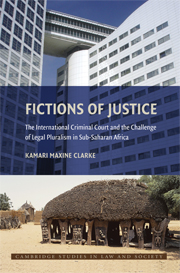 Fictions of Justice
Fictions of Justice Published online by Cambridge University Press: 23 January 2010
In the midst of the expansion of the International Criminal Court (ICC) and its African-based prosecutions, Africa has witnessed rapid religious recomposition in recent decades marked by new scales of religious organization, new directional flows of influence, assertive new theologies, and intensified public presences. This chapter focuses on the ways that different forms of religious ethical value are central to both the human rights principles shaping the rule of law movement and to key revivalist Muslim commitments in other parts of sub-Saharan Africa. Here I examine a particular West African–Islamic politicolegal trajectory and situate it within the recent expansion of the rule of law. At the heart of this chapter is an inquiry into what new tensions are emerging at the intersections of “religious” and political projects. How, I ask, do current radical religious contestations within African polities – or between religious doctrines and secular legal codes – inform wider theoretical and legal debates on the ambiguous conceptual groundings of the “secular”; on rights and duties; and on the presumptive norms of liberalist citizenship central to its production of individual personhood? How does a different rendering of obligation and authority produce a politics of incommensurability that is beyond liberalist recognition?
THE ICC: A MOVEMENT IN THE MAKING
In liberalist circles until the mid-twentieth century, the international notion of “rights” was predominately associated with domestic issues and rested on the nation-state as the grantor and protector of rights.
To save this book to your Kindle, first ensure [email protected] is added to your Approved Personal Document E-mail List under your Personal Document Settings on the Manage Your Content and Devices page of your Amazon account. Then enter the ‘name’ part of your Kindle email address below. Find out more about saving to your Kindle.
Note you can select to save to either the @free.kindle.com or @kindle.com variations. ‘@free.kindle.com’ emails are free but can only be saved to your device when it is connected to wi-fi. ‘@kindle.com’ emails can be delivered even when you are not connected to wi-fi, but note that service fees apply.
Find out more about the Kindle Personal Document Service.
To save content items to your account, please confirm that you agree to abide by our usage policies. If this is the first time you use this feature, you will be asked to authorise Cambridge Core to connect with your account. Find out more about saving content to Dropbox.
To save content items to your account, please confirm that you agree to abide by our usage policies. If this is the first time you use this feature, you will be asked to authorise Cambridge Core to connect with your account. Find out more about saving content to Google Drive.